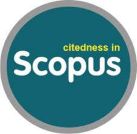IMPLEMENTASI GERAKAN LITERASI SEKOLAH DITINJAU DARI TAHAP PENGEMBANGAN DI SD MUHAMMADIYAH
Abstract
Full Text:
HAL. 121-134References
Anitah Sri W, D. (2008). Strategi Pembelajaran di SD. Jakarta: Universitas Terbuka.
Antoro, B. (2017). Gerakan Literasi Sekolah. Dari Pucuk Hingga Akar. Jakarta: Direktorat Jenderal Pendidikan Dasar dan Menengah Kementerian Pendidikan dan Kebudayaan.
Boyacı, Ş. D. B., & Atalay, N. (2016). A Scale Development for 21st Century Skills of Primary School Students : A Validity and Reliability Study 1. International Journal of Instruction, 9(1). https://doi.org/10.12973/iji.2016.9111a
Dharma, S. (2014). Tragedi Nol Buku: Tragedi di Dunia Pendidikan Indonesia.
Direktorat Jenderal Pendidikan Dasar dan Menengah. (2016). Desain Induk Gerakan Literasi Sekolah. Http://Repositori.Perpustakaan.Kemdikbud.Go.Id. Jakarta: Direktorat Jenderal Pendidikan Dasar dan Menengah Kementerian Pendidikan dan Kebudayaan.
Harahap, M. H., Hasibuan, N. I., Cerah, A., & Azis, K. (2017). PENGEMBANGAN PROGRAM LITERASI SEKOLAH. Jurnal Pembangunan Perkotaan, 5, 115–128.
Ihsan, H. F. (2013). Dasar-Dasar Kependidikan (8th ed.). Jakarta: PT Rineka Cipta.
Kemendikbud. (2016). Panduan Gerakan Literasi Sekolah di Sekolah Dasar. Jakarta: Direktorat Jenderal Pendidikan Dasar dan Menengah Kementerian Pendidikan dan Kebudayaan.
Moleong. (2017). Metode Penelitian Kualitatif. Bandung: Remaja Rosdakarya.
Morocco, C. C. (2010). Supported literacy for adolescents: Transforming teaching and content learning for the 21st century. In J. W. & Sons. (Ed.). Amerika.
Oghenekohwo, J. E., & Frank-Oputu, E. A. (2017). Literacy Education and Sustainable Development in Developing Societies. International Journal of Education & Literacy Studies, 5(2). https://doi.org/10.7575/aiac.ijels.v.5n.2p.126
Sugiyono. (2014). Metode Penelitian Pendidikan pendekatan Kuantitatif, Kualitatif, dan R & D. Bandung: Alfabeta.
Suharmono, K. (2015). Upaya Meningkatkan Minat Baca Sebagai Sarana Untuk Mencerdaskan Bangsa. Jurnal Pena Indonesia (JPI), 1(1), 80–95.
Tarigan, H. G. (2008). Membaca Sebagai Suatu Keterampilan Berbahasa. Bandung: Percetakan Angkasa.
Triatma, I. N. (2016). Minat Baca Pada Siswa Kelas VI Sekolah Dasar Negeri Delegan. E-Jurnal Prodi Teknologi Pendidikan, V Nomor 6(Teknologi Pendidikan), 166–178.
DOI: https://doi.org/10.17509/md.v16i2.21732
Refbacks
- There are currently no refbacks.
.png)
Universitas Pendidikan Indonesia, Purwakarta Campus
Jl. Veteran No. 8. Purkawarta
West Java, Indonesia
Email: metodikdidaktik@upi.edu


























